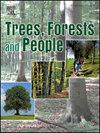Stop disregarding tropical forest management as a conservation option
IF 2.9
Q1 FORESTRY
引用次数: 0
Abstract
Most tropical forests with merchantable timber will continue to be logged selectively because not all species or trees produce merchantable wood (unless wood chip markets develop). Based on biodiversity and carbon stock values as well as environmental sensitivity, logging should be prohibited in some of the area designated for this purpose. Unfortunately, until adequate compensation for these values is available, logging will continue. The unmet and too often disregarded challenge is therefore to transform timber exploitation to forest management for a wide range of goods and services. Compliance with government-mandated minimum cutting diameters and cutting cycles would help even though they allow timber volumes to decline with each harvest. Declining yields and profits cause highly capitalized industrial firms to be replaced by loggers with lower costs and lower expected profits. If recommended silvicultural treatments are applied, timber yields can be sustained but with up-front financial costs as well as long-term and intended impacts on forest composition. This transition from forest exploitation to management is impeded by insecurity about continued access to the resource, low log prices, the availability of illegally harvested timber, and disregard of the management option by too many conservation-oriented researchers.
One-Sentence Summary
Managed tropical forests are environmentally valuable but more environmentally concerned scientists need to help improve management.
停止忽视热带森林管理作为一种保护选择
大多数拥有可出售木材的热带森林将继续被选择性地砍伐,因为并非所有物种或树木都能生产可出售木材(除非木片市场发展起来)。基于生物多样性和碳储量价值以及环境敏感性,在一些指定用于这一目的的地区应禁止伐木。不幸的是,在对这些值进行充分补偿之前,日志记录将继续进行。因此,未解决和经常被忽视的挑战是将木材开采转变为各种商品和服务的森林管理。遵守政府规定的最小采伐直径和采伐周期将有所帮助,尽管它们允许木材量随着每次采伐而下降。产量和利润的下降导致高度资本化的工业公司被成本更低、预期利润更低的伐木者所取代。如果采用建议的造林处理方法,木材产量可以维持,但要付出前期财政成本以及对森林组成的长期和预期影响。这种从森林开采到管理的转变受到下列因素的阻碍:对继续获得资源的不安全感、低原木价格、非法采伐木材的可得性以及太多注重保护的研究人员无视管理选择。经管理的热带森林具有环境价值,但是更关心环境的科学家需要帮助改进管理。
本文章由计算机程序翻译,如有差异,请以英文原文为准。
求助全文
约1分钟内获得全文
求助全文
来源期刊

Trees, Forests and People
Economics, Econometrics and Finance-Economics, Econometrics and Finance (miscellaneous)
CiteScore
4.30
自引率
7.40%
发文量
172
审稿时长
56 days
 求助内容:
求助内容: 应助结果提醒方式:
应助结果提醒方式:


